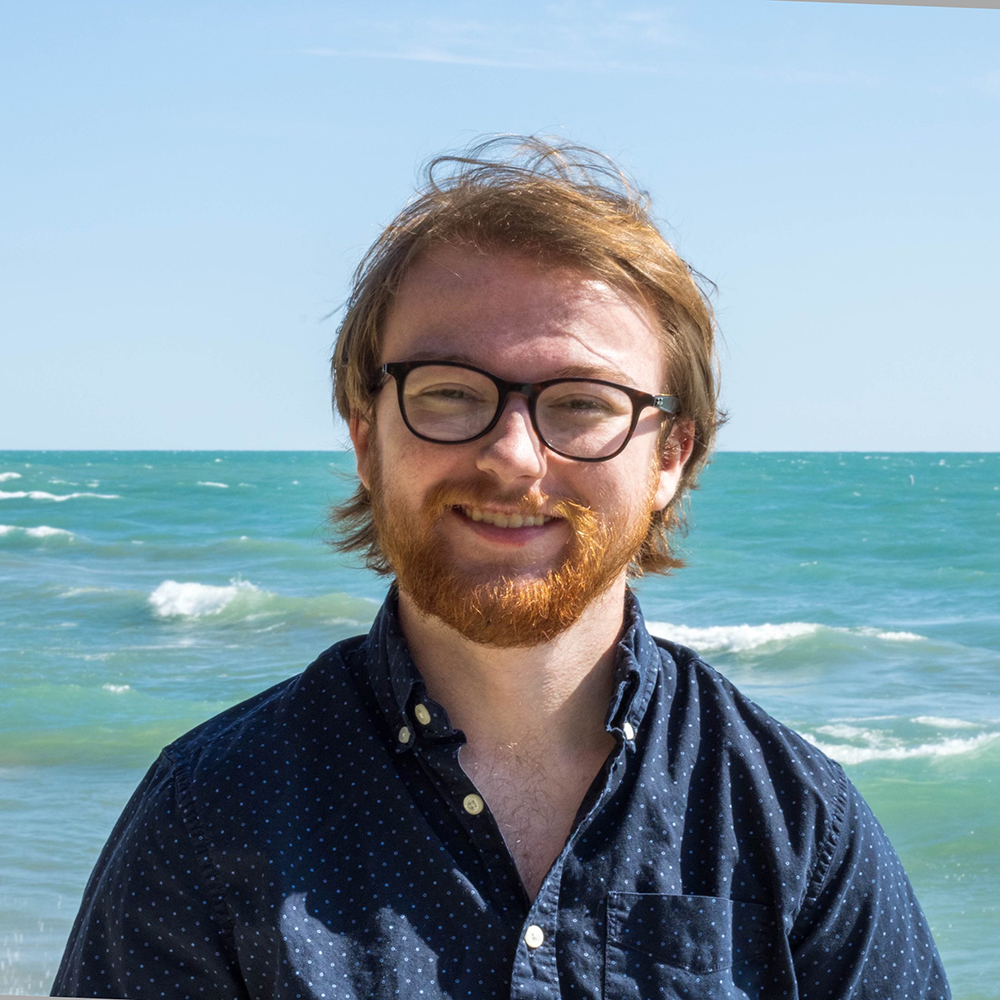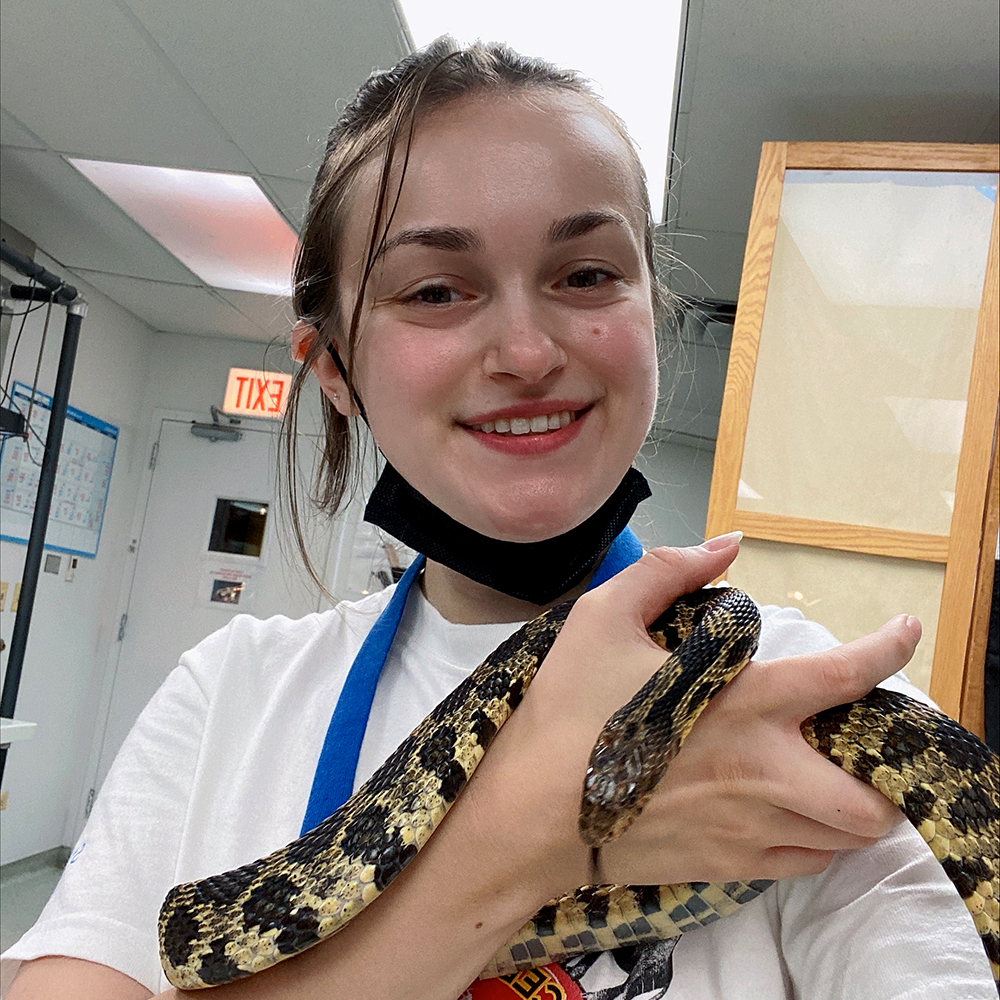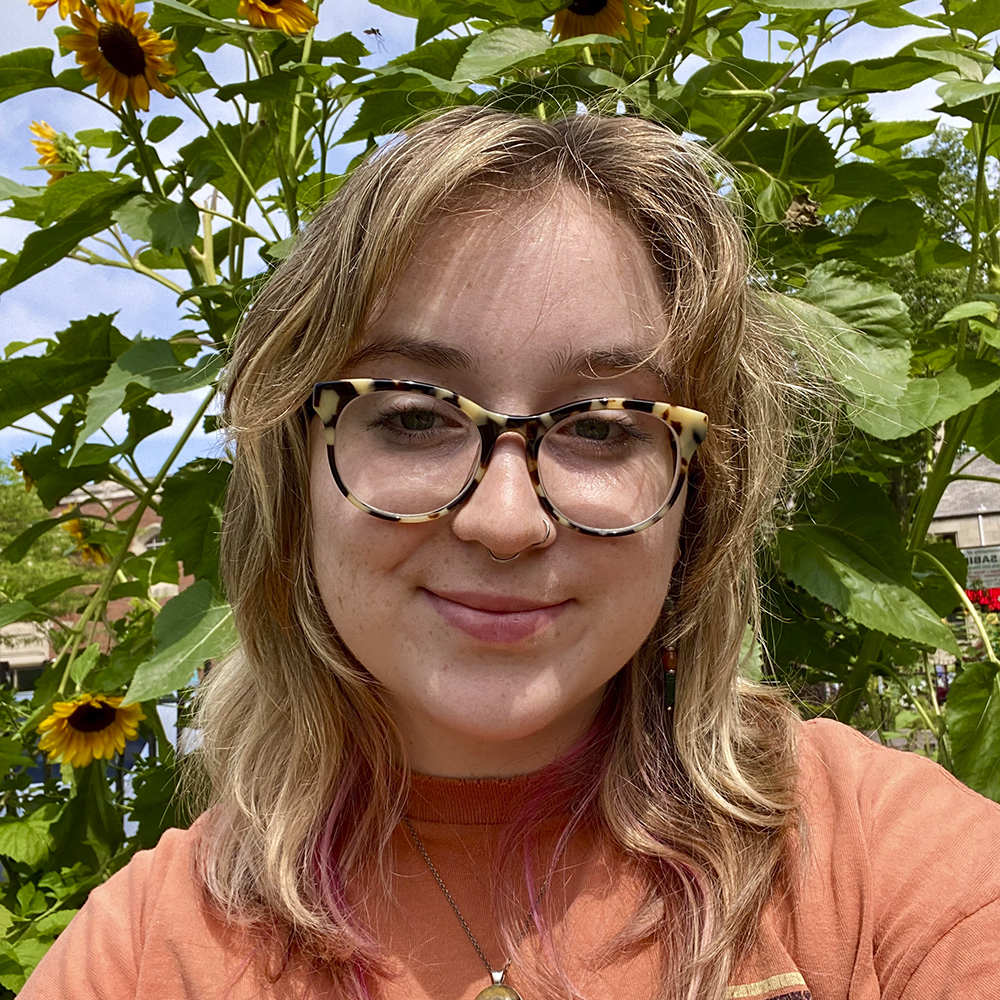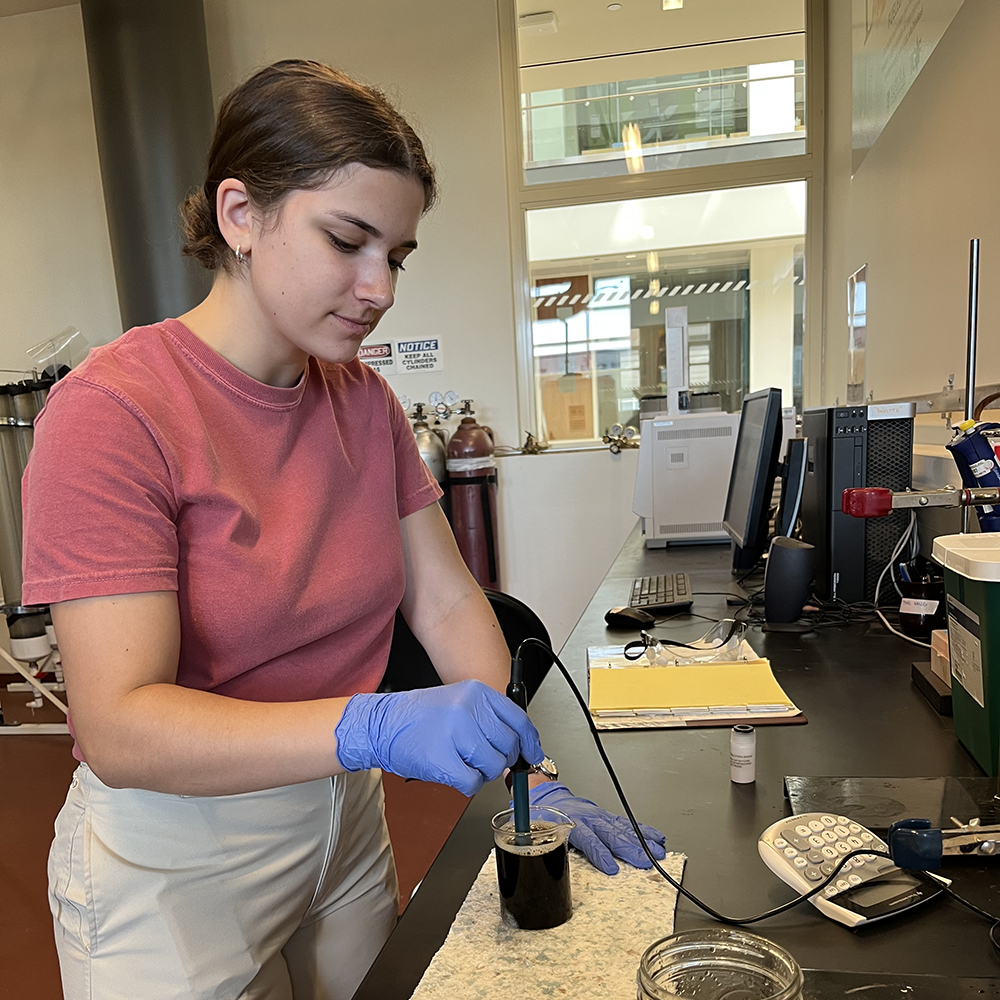Internships 2022
Students Share Their Summer Internship Experiences
Story by Alex Quebbeman
Students in the School of Environmental Sustainability benefit from a wide variety of hands-on, applied learning opportunities, including internships. Within SES, students interns gain skills while working in areas such as the Urban Agriculture Program, the Searle Biodiesel Lab, and the Office of Sustainability. SES also works with partner organizations to offer internships at leading regional environmental organizations such as the Peggy Notebaert Nature Museum, the Environmental Law and Policy Center, the Delta Institute, and the Chicago Council on Science and Technology.
Over the summer, many students participated in internships that enriched their education, provided real-world professional experience, and expanded their social and professional networks. Several shared their thoughts on what they gained from their summer internships.

John Gorman
Intern at the Environmental Law and Policy Center and the Peggy Notebaert Nature Museum
“My favorite part is seeing how everything I’m doing is connected to real-world environmental issues. I like being able to see the overarching issue we’re trying to tackle relate to the specific steps I’m able to take to help achieve those goals.”
John Gorman, a senior majoring in environmental science and chemistry, interned at the Environmental Law and Policy Center and the Peggy Notebaert Nature Museum over the summer.
John was a science and policy intern at the Environmental Law and Policy Center, where he handled and visualized data for projects about water quality in Wisconsin and air quality in Chicago. While navigating work as a part of a larger team, John was able to see the bigger picture of his job. “My favorite part is seeing how everything I’m doing is connected to real-world environmental issues,” John said. “I like being able to see the overarching issue we’re trying to tackle relate to the specific steps I’m able to take to help achieve those goals.” His work with the data informs staff elsewhere working on advocacy or with Congress.
At the Peggy Notebaert Nature Museum, John worked behind the scenes doing georeferencing as a collections intern. With his experience taking geographic information systems (GIS) courses at Loyola, he was looking to use those skills in a professional setting. As an intern, John worked with plant archives. “Each plant will be on a piece of paper, preserved with a tag saying when and where it was found. It’s my job to go through those. So, say a plant was found in Chicago, I’d put a pin on a map virtually with a radius around it,” John explained. “In a sense, it’s like ‘pre-research’ to help out people who would do research on that in the future.”
John also recently started interning at the Searle Biodiesel Lab in SES, where he will get the chance to work with environmental chemistry in action. “I’m excited to use my chemistry skills from the classroom to reduce emissions on campus,” he said.

Julianna Scivinsky
Animal Husbandry Intern at the Peggy Notebaert Nature Museum
“For as long as I can remember, I have always had a great will to help animals, no matter their shape or size.”
Julianna Scivinsky recently graduated with a bachelor’s degree in environmental science: conservation and restoration ecology. This fall, she started the second year of the SES master’s degree program in environmental science and sustainability. Over the summer, Julianna worked as an animal husbandry intern at the Peggy Notebaert Nature Museum, where she handled the care and behavior management of the endangered Blanding’s turtles. She also worked with toads, frogs, salamanders, snakes, and invertebrates.
“For as long as I can remember, I have always had a great will to help animals, no matter their shape or size,” Julianna said. In high school, she became interested in the study of reptiles and amphibians, and every summer she helps rescue injured or abandoned animals in her free time. As an undergraduate student, she also worked with aquatic invasive species in Associate Professor Reuben Keller’s lab.
When Julianna started working with reptiles and amphibians, it took a lot of patience and observation to learn how to care for them. For example, “learning how to properly handle frogs is extremely valuable,” she said. “Many people do not realize that you need to have adequately misted hands before handling the frogs because their skin is very sensitive to hand oils from humans.” Julianna now has the skills to handle these animals and has gained knowledge on the endangered Blanding’s turtles. The experience will be invaluable in her future conservation work.

Iris Michael
Intern at the Stein Learning Garden
“Some students were terrified of bugs or touching soil early in the season, but by the end of the summer, they were confidently taking care of the plants.”
Iris Michael is a junior studying environmental science: food systems and sustainable agriculture and studio art. She interned with Stein Learning Gardens this summer. In this position, Iris planned and facilitated lessons and snacks for students aged six to 14. She also helped grow and distribute food to the local Auburn Gresham community.
With her interest in food justice, Iris wanted to work with the Stein Learning Garden to combat the food apartheid in that area. “Since I began this internship in May, many grocery stores have closed, including the Englewood Whole Foods and Auburn Gresham Aldi,” Iris said. “The farm stand and educational programming help combat this issue by providing fresh produce and resources on how to prepare it.”
Though there was a learning curve, Iris’ favorite part of the internship was working with the students. Having to balance education with fun isn’t always easy, Iris admitted, but it was very rewarding to see the students’ interest and confidence grow. “I remember how some students were terrified of bugs or touching soil early in the season, but by the end of the summer, they were confidently taking care of the plants,” Iris said.
Coming into this position, Iris knew she had a passion for sustainable agriculture, but she’s now learned that she wants to share that passion with others. “This opportunity greatly improved my leadership skills and made me realize that education may be in my future,” she said.

Caitlin Aquila
Intern in the Searle Biodiesel Lab at Loyola
“It’s definitely a mix of chemistry and hands-on work, which I think is cool because I learned about a lot of the chemistry topics in classes. In the lab, we’re applying them and it helps me solidify my learning.”
Caitlin Aquila, a senior in environmental science, works as an intern in the Searle Biodiesel Lab at Loyola. In the lab, Caitlin helps with day-to-day operations and monitoring of biodiesel and biosoap production.
One facet of her internship allows her to use what she’s learned in coursework in a functional operation. “It’s definitely a mix of chemistry and hands-on work, which I think is cool because I learned about a lot of the chemistry topics in classes. In the lab, we’re applying them and it helps me solidify my learning,” Caitlin said.
Her favorite part of interning in the Biodiesel Lab is who she gets to work with. “I’m really excited to work every day. It’s because of the people. If anyone asks me what I like about SES, I always say it’s the community, whether it be professors or students, and that carries through to the Biodiesel Lab, too.”
With plans to start an MBA program in the spring to pursue sustainable business management, Caitlin also gets to see how a sustainable business model works up close. Zach Waickman, the Biodiesel Lab manager, is always eager to explain the business side of things and answer any questions Caitlin has. This fall, she is taking a sustainable business management course, which will tie in with her internship and future plans.
Story by Alex Quebbeman
Students in the School of Environmental Sustainability benefit from a wide variety of hands-on, applied learning opportunities, including internships. Within SES, students interns gain skills while working in areas such as the Urban Agriculture Program, the Searle Biodiesel Lab, and the Office of Sustainability. SES also works with partner organizations to offer internships at leading regional environmental organizations such as the Peggy Notebaert Nature Museum, the Environmental Law and Policy Center, the Delta Institute, and the Chicago Council on Science and Technology.
Over the summer, many students participated in internships that enriched their education, provided real-world professional experience, and expanded their social and professional networks. Several shared their thoughts on what they gained from their summer internships.
John Gorman, a senior majoring in environmental science and chemistry, interned at the Environmental Law and Policy Center and the Peggy Notebaert Nature Museum over the summer.
John was a science and policy intern at the Environmental Law and Policy Center, where he handled and visualized data for projects about water quality in Wisconsin and air quality in Chicago. While navigating work as a part of a larger team, John was able to see the bigger picture of his job. “My favorite part is seeing how everything I’m doing is connected to real-world environmental issues,” John said. “I like being able to see the overarching issue we’re trying to tackle relate to the specific steps I’m able to take to help achieve those goals.” His work with the data informs staff elsewhere working on advocacy or with Congress.
At the Peggy Notebaert Nature Museum, John worked behind the scenes doing georeferencing as a collections intern. With his experience taking geographic information systems (GIS) courses at Loyola, he was looking to use those skills in a professional setting. As an intern, John worked with plant archives. “Each plant will be on a piece of paper, preserved with a tag saying when and where it was found. It’s my job to go through those. So, say a plant was found in Chicago, I’d put a pin on a map virtually with a radius around it,” John explained. “In a sense, it’s like ‘pre-research’ to help out people who would do research on that in the future.”
John also recently started interning at the Searle Biodiesel Lab in SES, where he will get the chance to work with environmental chemistry in action. “I’m excited to use my chemistry skills from the classroom to reduce emissions on campus,” he said.
Julianna Scivinsky recently graduated with a bachelor’s degree in environmental science: conservation and restoration ecology. This fall, she started the second year of the SES master’s degree program in environmental science and sustainability. Over the summer, Julianna worked as an animal husbandry intern at the Peggy Notebaert Nature Museum, where she handled the care and behavior management of the endangered Blanding’s turtles. She also worked with toads, frogs, salamanders, snakes, and invertebrates.
“For as long as I can remember, I have always had a great will to help animals, no matter their shape or size,” Julianna said. In high school, she became interested in the study of reptiles and amphibians, and every summer she helps rescue injured or abandoned animals in her free time. As an undergraduate student, she also worked with aquatic invasive species in Associate Professor Reuben Keller’s lab.
When Julianna started working with reptiles and amphibians, it took a lot of patience and observation to learn how to care for them. For example, “learning how to properly handle frogs is extremely valuable,” she said. “Many people do not realize that you need to have adequately misted hands before handling the frogs because their skin is very sensitive to hand oils from humans.” Julianna now has the skills to handle these animals and has gained knowledge on the endangered Blanding’s turtles. The experience will be invaluable in her future conservation work.
Iris Michael is a junior studying environmental science: food systems and sustainable agriculture and studio art. She interned with Stein Learning Gardens this summer. In this position, Iris planned and facilitated lessons and snacks for students aged six to 14. She also helped grow and distribute food to the local Auburn Gresham community.
With her interest in food justice, Iris wanted to work with the Stein Learning Garden to combat the food apartheid in that area. “Since I began this internship in May, many grocery stores have closed, including the Englewood Whole Foods and Auburn Gresham Aldi,” Iris said. “The farm stand and educational programming help combat this issue by providing fresh produce and resources on how to prepare it.”
Though there was a learning curve, Iris’ favorite part of the internship was working with the students. Having to balance education with fun isn’t always easy, Iris admitted, but it was very rewarding to see the students’ interest and confidence grow. “I remember how some students were terrified of bugs or touching soil early in the season, but by the end of the summer, they were confidently taking care of the plants,” Iris said.
Coming into this position, Iris knew she had a passion for sustainable agriculture, but she’s now learned that she wants to share that passion with others. “This opportunity greatly improved my leadership skills and made me realize that education may be in my future,” she said.
Caitlin Aquila, a senior in environmental science, works as an intern in the Searle Biodiesel Lab at Loyola. In the lab, Caitlin helps with day-to-day operations and monitoring of biodiesel and biosoap production.
One facet of her internship allows her to use what she’s learned in coursework in a functional operation. “It’s definitely a mix of chemistry and hands-on work, which I think is cool because I learned about a lot of the chemistry topics in classes. In the lab, we’re applying them and it helps me solidify my learning,” Caitlin said.
Her favorite part of interning in the Biodiesel Lab is who she gets to work with. “I’m really excited to work every day. It’s because of the people. If anyone asks me what I like about SES, I always say it’s the community, whether it be professors or students, and that carries through to the Biodiesel Lab, too.”
With plans to start an MBA program in the spring to pursue sustainable business management, Caitlin also gets to see how a sustainable business model works up close. Zach Waickman, the Biodiesel Lab manager, is always eager to explain the business side of things and answer any questions Caitlin has. This fall, she is taking a sustainable business management course, which will tie in with her internship and future plans.
